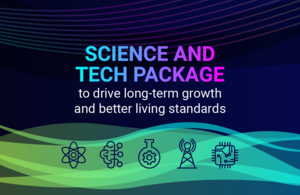Biotech driving medical breakthroughs and cuts to red tape lead major science and tech package to spark UK innovation and growth
Science and Technology Secretary Michelle Donelan set out the importance of the UK’s mission to be a science and technology superpower.

Biotech driving medical breakthroughs and cuts to red tape lead major science and tech package to spark UK innovation and growth
- The Science and Tech Secretary unveils a raft of new announcements to drive innovation in science.
- comes alongside rallying cry to entrepreneurs, businesses, researchers and government to put science and technology at the very top of the UK’s priorities – or risk failing to secure long term growth.
- science and technology department marks its first anniversary, at the end of a week of significant announcements that will achieve a strategic advantage for the UK in all five of its critical technologies.
£100 million has been awarded to biotech projects across the UK to help pioneer new technologies that will help prepare for pandemics, innovate farming, and protect against floods.
The cash will be given to six new ‘Engineering Biology Mission Hubs’ and 22 ‘Mission Award’ projects across the country, that will look to build on Engineering Biology’s enormous potential to address global challenges, drive economic growth, and increase national resilience.
It comes as the government doubles down on its commitment support growth and innovation in science by slashing research red tape – unshackling scientists so they can spend more time in the lab creating new vaccines rather than filling out unnecessary forms.
On a visit to the UK Biobank in Stockport earlier this week (Wednesday 7 February), Science and Technology Secretary Michelle Donelan set out the importance of the UK’s mission to be a science and technology superpower, at the end of a week where the UK demonstrated a year of clear progress on the UK’s five critical technologies – AI, quantum, engineering biology, future telecoms and semiconductors.
The Science and Technology Secretary also unveiled a package of announcements to drive further momentum behind the Department’s work including £21 million for the world-leading Biobank. The UK Biobank has been given the cash injection for a new robotic freezer, which will be used to store 20 million samples of biological data - further supporting research that is being used to treat diseases like dementia and Parkinson’s.
This investment will deliver the long-term innovative change needed to deliver a brighter future for Britain and improve economic security and opportunity for everyone.
Science and Technology Secretary Michelle Donelan said:
Long term growth is the only way we will deliver the public services and improvements in living standards that every Briton wants for themselves and their families.
But as history shows, it is technological and scientific advances that are the true engine room of growth, and despite our existing strengths in these sectors, we cannot afford to pat ourselves on our back and take our eye off the ball.
Cementing the UK as a Science and Technology superpower by 2030 is more than a slogan. It is a goal we must reach if we want to grow our economy, continue creating well-paid jobs and build a better, healthier, more prosperous future for the UK.
The comprehensive bundle of new announcements and pledges will be integral to making the UK a science and technology superpower by 2030 and delivering long-term change across the country.
Other announcements produced today include:
- Announcing the winners of the Research Ventures Catalyst seed funding– with up to £100,000 available for organisations finding new and innovative ways to fund world-class R&D in the UK.
- Updating the Science and Technology Framework – outlining progress since the launch of the Framework last year - showing the government is providing record levels of funding to R&D in the UK with over £19.4 billion in the past year, supporting top researchers to spread the benefits of innovation - more jobs, opportunities, prosperity – across the country.
- Publishing two UK-led G7 papers on R&D common values and best practices - showing again the UK’s global leadership in the science and tech world and ensuring research is being conducted in a way that protects, rather than undermines, national security.
- Launching a £3 million metascience grant funding call – aimed at boosting the efficiency and effectiveness of the UK’s already world-leading research system.
- Launching an interactive innovation clusters map - offering a comprehensive picture of innovation activity in the UK aimed at helping policymakers and investors to better understand, engage with and invest in the UK’s vibrant innovation ecosystem.
The measures will build on the record £19.4 billion invested in research and this year alone, the highest level this country has ever seen, and the nearly three quarter of a million jobs the sector has created in the last decade (a 41% increase). Statistics show that every £1 Innovate UK alone invests in grants for business innovation returns over £3.60 in direct business benefit, with a total economic return valued at over £6.20.
Notes to editors
The announcements the Department for Science, Innovation and Technology are announcing today in full are:
- The government’s response to the Independent Review of Research Bureaucracy
- £7 million funding to the National Timing Centre R&D Programme for Quantum Clocks
- An update to the government’s progress on the Science and Technology Framework
- £100 million of UKRI funding towards UK Engineering Biology Mission Hubs and Mission Award projects
- Update on the joint UKRI/DSIT Metascience Unit’s progress and the launch of a £3 million metascience grant funding call
- Winners of the Research Ventures Catalyst seed funding
- Launch of the government Cluster Mapping Tool
- Publication of the G7 common values and principles on research security and Research Integrity and G7 best practices for secure and open research papers